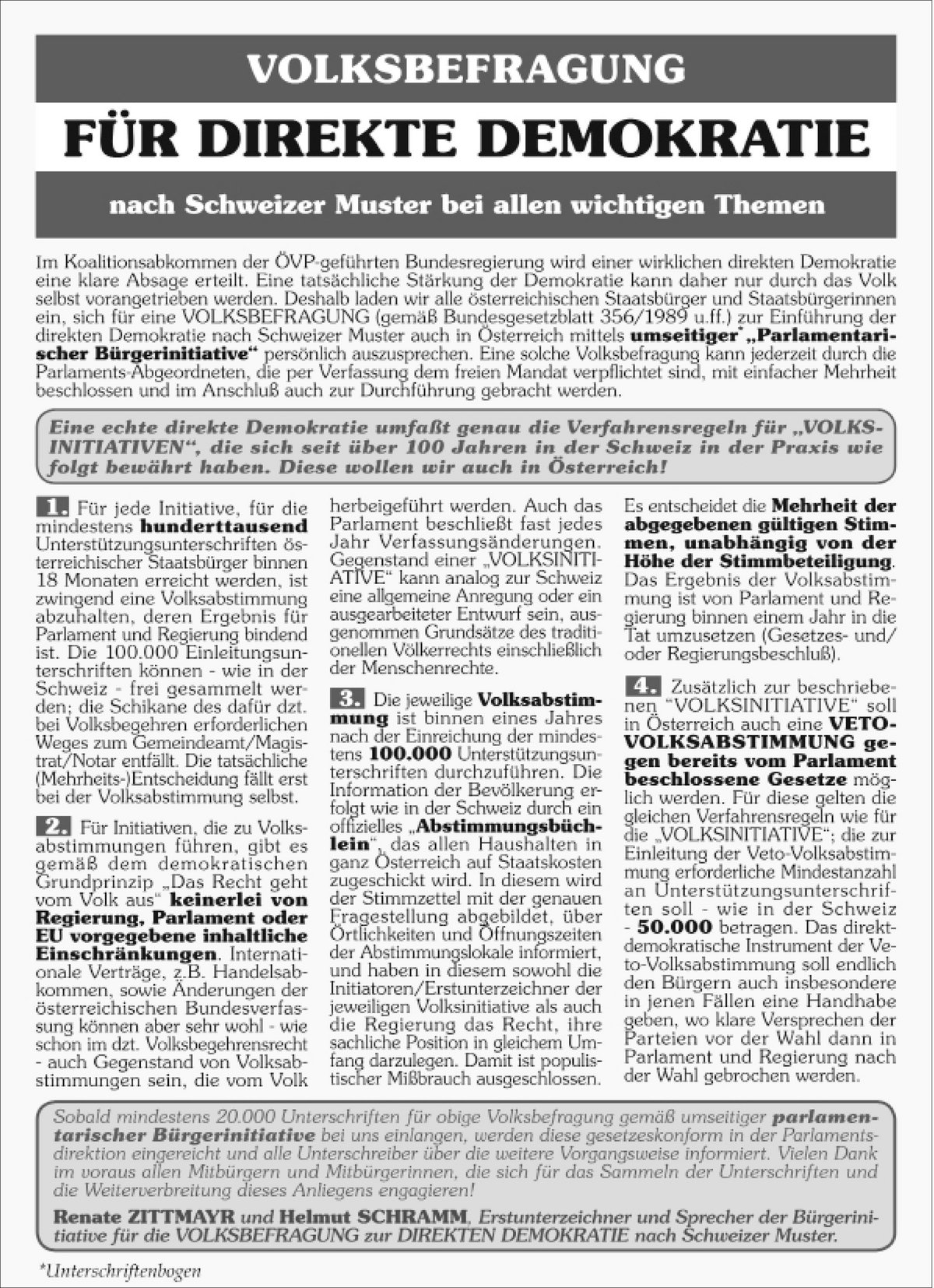New referendum on direct democracy started Government to remember election promises
New referendum on direct democracy started Government to remember election promises
New ÖVP/FPÖ Federal Government*
from the editors of the Austrian “Wegwarte”
After the election campaigns of the last two years, no one who does not consider from the outset every politician›s statement a lie, could have imagined how years of pledges to voters, just a few weeks after the election would not just be broken, but be reversed downright. The coalition pact (“government program”) was obviously largely dictated by the Kurz-ÖVP, but it was not predictable, that the FPÖ suchlike “gave in” in particular in the demands that they had previously credibly and emphatically formulated as irrevocable condition in hundreds of interviews, election speeches, etc.. We have drawn the necessary consequences from this.
One can only hope that the basis of this party, which had nothing to say at all, does not support this path and remembers that just a year ago, namely on 24 March 2017, during the Federal Party Congress of the FPÖ in Klagenfurt – (allegedly) the highest party body – several hundred delegates from all states unanimously adopted a leading motion for direct democracy, which expressly stated that the people should be able to bring about binding referendums on all, including EU issues. And then the party leadership signs a coalition pact in which exactly this is excluded, almost forbidden!
Who really governs our country?
This was already on 11 May 2014 the verbatim text of a large advertisement in the “Kronen-Zeitung”; so you know very well that with the de facto ban on referendums on all EU issues, the entire constitutive people, not just the FPÖ voters, are excluded from any say. And also the governing parties themselves, even if they wanted so, can not resist with such an attitude in the interests of Austria against the planned further central government goals of the EU, because they destroy any “levers” from the outset. No wonder that the turquoise chancellor “had to” present this in Brussels even before the government programme was presented in the Austrian parliament. No wonder that EU Commission President Juncker says personaly he is “100 per cent” in agreement with this government programme.
Weakening instead of strengthening democracy
Although the declarations of intent in the government program on pages 19 and 20 are overwritten with “strengthening democracy”, in practice they are exactly the opposite. The government wants to implement very quickly most notably one change in referendums, namely that in future only fully formulated legal texts (with all formal pitfalls) may be the subject of referendums and no longer – as before – also legislative proposals. This is not an improvement, but an obstacle for popular initiatives that do not have expert lawyers at their disposal, paid by our taxes, as do parliamentary parties or ministries.
However, but even worse is what has to be decided only after 2020, namely that first, binding referenda should be implemented only from an absurdly high hurdle of 900,000 signatures which have to be submitted to the authorities. Of the 39 total referenda that took place in the Second Republic, only three have reached this hurdle!
Secondly that the prerequisite for referenda obtained by popular petitions is an obligatory “prior check” by the Constitutional Court, in which the Court “did not find any contradiction with Austria’s obligations under basic, international and European law”. This means that this government does not want to allow any popular votes on existing or forthcoming EU regulations. This amounts to a complete surrender of Austria. Who will sign a referendum if it is clear from the outset that this must not lead to a binding referendum? This has not been impossible so far ….
In addition, it is noted that “Austria’s membership in the EU and other international organisations is not covered by the scope of this legal institution.” In other words, we were allowed to vote on joining the EU, but we are not allowed to vote on a possible exit (as in Great Britain)!
Furthermore, another virtually insurmountable obstacle is planned: a minimum quorum should be introduced for the few referenda that could still take place in light of all the conditions mentioned above. The votes for the implementation of the referendum must represent at least one third of the population eligible to vote. To illustrate, that would be over 2.1 million votes. Even the ÖVP of Chancellor Sebastian Kurz now has only 1.6 million votes or around 25% of the eligible voters.
Since the new government also provides that the National Council is able to bring a counterproposal to each referendum to the vote (which will certainly be widely advertised across all channels), the voting participation must be at least 66% with close consent to the concern, in order to fulfil the planned mandatory quorum. No other European country has such a referendum barrier.
This “package of undemocracy” bears the signature of Chancellor Kurz, who decided on it years ago as head of the Young ÖVP.
Switzerland, the home of direct democracy, has no voting quorum at all and also no restrictions on the subject of referenda! Every result of a referendum is recognised by friend and foe; after all, all citizens would have had the opportunity to have their say. From 1863 to 2012, there were 388 (!) referenda in Switzerland, which came about by popular initiatives or veto-referenda.
* ÖVP Austrian People’s Party, FPÖ Freedom Party of Austria
Source: Mitteilungen der Initiative Heimat & Umwelt In: Wegwarte, February 2018 <link http: www.heimat-und-umwelt.at>www.heimat-und-umwelt.at, <link>ihu@a1.net
(Translation Current Concerns)
